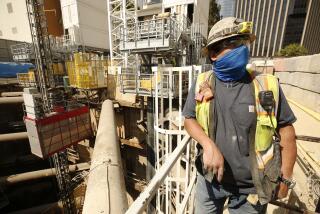Japan OKs Plan to Open Public Works Projects to Outside Firms : Trade: Proposal beats deadline for U.S sanctions, but impact is unclear. Tokyo hopes it will cut domestic corruption.
- Share via
TOKYO — Responding to domestic construction scandals and the threat of U.S. trade sanctions, Japan on Tuesday approved a plan to open major public works projects to foreign contractors. But the practical impact of the program was unclear because some key details were not spelled out, and U.S. officials reserved comment until they could study it further.
The plan, unveiled in an attempt to avert a nasty trade skirmish just two days ahead of a deadline set by Washington, will be phased in during a one-year period starting in April. It aims to revise bidding procedures to enhance “transparency, objectivity and competitiveness” so that foreign firms can compete on a more equal basis with Japanese companies. Various restrictions that have often blocked foreign firms from eligibility to bid on projects will be relaxed or eliminated.
A web of inside connections, bid rigging, bribery and restrictive regulations has long kept the lucrative Japanese construction market mostly closed to foreign firms. The issue has been a recurrent focus of U.S.-Japan trade talks for many years.
The reformist government of Prime Minister Morihiro Hosokawa pledged in October to come up with a market-opening plan very early this year. The Clinton Administration responded by postponing a threatened imposition of sanctions against Japanese construction firms in the United States, setting a new deadline of Jan. 20.
By establishing a more open and objective bidding procedure, the new rules also should undercut--at least to some degree--the ability of Japanese construction firms and corrupt politicians to abuse the process.
Central-government construction projects must be conducted under the new rules if they are worth at least $6.4 million, while design and consulting contracts worth at least $640,000 come under the guidelines. Government-owned corporations must use the new open bidding process for construction projects of $21.3 million or more. Local governments are also encouraged, but not legally required, to adopt the new guidelines.
The so-called action plan also promises heavier penalties against companies that violate the new open bidding rules by bribery or bid rigging. However, it does not specify what those penalties will be, nor does it set targets for increased foreign market share. The practical results of the promised new openness thus remain to be seen.
Officials in Washington said they are studying the proposal and will decide by Thursday whether the pledge to reform obviates the need to slap sanctions on Tokyo. In recent days, however, U.S. officials have said they believe the plan will prove acceptable enough that sanctions will not be implemented.
In October, when Japan promised to draw up new rules opening its construction market, U.S. Trade Representative Mickey Kantor called the announcement “historic.” He said it gave the United States “tremendous hope” that other key obstacles in the U.S.-Japan economic relationship could be overcome.
But in the case of construction, Washington was simply pushing the Hosokawa government to do something it wanted to do anyway. A wave of bribery scandals under the existing system had produced outrage among the Japanese public, which in turn helped bring Japan’s current coalition government to power in August on a platform of cleaning up the mess.
Reuters contributed to this report.
More to Read
Sign up for Essential California
The most important California stories and recommendations in your inbox every morning.
You may occasionally receive promotional content from the Los Angeles Times.













